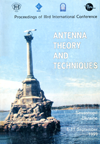Tunable waveguide bandpass filters with a near constant bandwidth
DOI:
https://doi.org/10.1109/ICATT.1999.1236274Abstract
Tunable bandpass microwave filters are widely used in telecommunication systems. In transmit stations ferrite or mechanically tunable waveguide filters are commonly used due to capability to transmit high power levels.
The principal disadvantage of mechanically tunable filters built upon traditional inductive or capacitive discontinuities is a considerable alteration of band-width under the variation of resonance frequencies of the resonators. Bandwidth of filters with inductive discontinuities is becoming narrower under tuning to the lower operating frequencies. In contrary, a band-width alteration of filters with capacitive discontinuities has an inverse dependence under tuning and, what is more, its steepness is less then for the filters with inductive discontinuities. But in the event of capacitive discontinuities transmit power level is essentially decreased due to small gaps between their ridges.
In this paper a new approach to building mechanically tunable bandpass filters with a near constant bandwidth is proposed. The main feature of the approach is a combination of inductive and capacitive discontinuities to build resonators. In order to illustrate the new approach an adequate mathematical model for the filter has been developed and a tunable waveguide narrow bandpass filter prototype with near constant bandwidth has been designed, developed, constructed and tested.
References
Mittra, R. (ed.). Computer Techniques for Electromagnetics. Pergamon Press, 1973.

